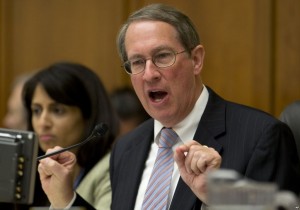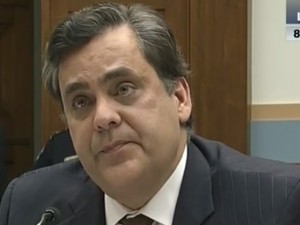UPDATE – As of 5PM Eastern, the House Judiciary Committee video is now view-able. Testimony begins at approximately minute 37. We have now embedded the video below.
Editor’s Note – Constitutional Crisis? Egregious erosion of the balance of power? Failure of the Judiciary to secure the balance? Failure to faithfully execute the laws? Why is the term ‘elastic power’ so important? What about the ‘guilt in the legal flaw of standing silent?’ Is there ‘Congressional despair because of the political interests’ of the President?
On Wednesday, February 27th, the House Judiciary Committee held a hearing on the subject of Executive Branch usurpation of power and what many believe is a failure of the President and his administration to live up to their oath under the Constitution where they accepted the duty to faithfully execute the laws of the land. Professor Turley had one very important statement: “We will all loathe the day we remained silent on the shift of power.”
Did you see it? Can you see it now? Why not? It may be the most important hearing held in decades – all need to watch. It was a civics lesson extraordinaire! Rep. Trey Gowdy (R-SC) and others really probed the waters deeply in a very legal manner that was also very non-politically slanted. But where were the Democrats? Sheila Jackson Leigh did show up, only long enough to rail that the Republicans were using such terms, and John Conyers was there as well, but…you be the judge.
The hearing was chaired by Rep. Bob Goodlatte (R-VA) with two panels of experts testifying and answering questions. Many of us caught parts of the almost three hour hearing and were riveted by the testimony. What was obvious from the outset was that many Democrats on the Committee did not even show up for this most important discussion about the law, the balance of powers, judicial standing, and how Americans, through their representatives can redress their grievances.
After the hearing, our staff went to the CSpan web site to download the entire video, but sadly, it was not there, nor is it there now. A call to CSpan was completely unproductive and the representative who spoke with us was not even aware that it had occurred. Incidentally, that representative hung up on us despite our very passive demeanor, we just wanted help in locating it.
We then went to the House Judiciary Committee web site and tried to view what they posted. It was there, but when we hit the play arrow, nothing happened.
Several of us, on different browsers, could not get it to work so we called them as well. The person who tried to help us successfully got the video to play on his end, but we still could not. He told us to wait another day; it would likely then be available. [The video is now available below]
Our question is hence, what does CSpan actually do, and why was the representative so callous and unhelpful to the point of hanging up on us? Secondly, why is something so very important, so hard to get to, especially when it was in direct aid by the media to get the content to the public?
%CODE%
What we do have is a very large Constitutional Crisis underway, and so few are paying attention. We saw some out takes on Fox News, but crickets were heard elsewhere, and we could not get access for some unknown reason. This has never been an issue in the past for our researchers.
Fortunately, others were watching and a great synopsis is posted here from the Washington Free Beacon. If you click on this link over the next day or so, maybe the House Judiciary Committee video will actually play. In the meantime, we also direct you to the opening remarks of Prof. Jonathan Turley here. It is long, both the video and the remarks, but all Americans need to pay very close attention to this crisis now.
‘The Imperial Presidency’
House holds hearing on executive overreach
BY: Elizabeth Harrington – Washington Free Beacon
Members of Congress and constitutional law experts testified before the House Judiciary Committee on Wednesday, warning that the legislative branch is in danger of ceding its power in the face of an “imperial presidency.”
The hearing, “Enforcing the President’s Constitutional Duty to Faithfully Execute the Laws,” focused on the multiple areas President Barack Obama has bypassed Congress, ranging from healthcare and immigration to marriage and welfare rules.

Chairman of the House Judiciary Committee is animated in his opening remarks at the hearing on enforcing the President’s duty to faithfully execute the laws on Weds., Feb., 26, 2014.
Jonathan Turley, Shapiro Professor of Public Interest Law at George Washington University, testified that the expansion of executive power is happening so fast that America is at a “constitutional tipping point.”
“My view [is] that the president, has in fact, exceeded his authority in a way that is creating a destabilizing influence in a three branch system,” he said. “I want to emphasize, of course, this problem didn’t begin with President Obama, I was critical of his predecessor President Bush as well, but the rate at which executive power has been concentrated in our system is accelerating. And frankly, I am very alarmed by the implications of that aggregation of power.”
“What also alarms me, however, is that the two other branches appear not just simply passive, but inert in the face of this concentration of authority,” Turley said.
While Turley agrees with many of Obama’s policy positions, he steadfastly opposes the method he goes about enforcing them.
“The fact that I happen to think the president is right on many of these policies does not alter the fact that I believe the means he is doing [it] is wrong, and that this can be a dangerous change in our system,” he said. “And our system is changing in a very fundamental way. And it’s changing without a whimper of regret or opposition.”
Elizabeth Price Foley, a law professor at Florida International University College of Law, agreed, warning that Congress is in danger of becoming “superfluous.”
“Situations like this, these benevolent suspensions as they get more and more frequent and more and more aggressive, they’re eroding our citizens’ respect for the rule of law,” she said. “We are a country of law and not men. It’s going to render Congress superfluous.”
 Foley said Congress is not able to tackle meaningful legislation out of fear that Obama would “simply benevolently suspend portions of the law he doesn’t like.”
Foley said Congress is not able to tackle meaningful legislation out of fear that Obama would “simply benevolently suspend portions of the law he doesn’t like.”
“If you want to stay relevant as an institution, I would suggest that you not stand idly by and let the president take your power away,” she said.
Panelists and members of Congress dismissed the idea of impeachment, and instead focused on lawsuits to challenge the constitutionality of the president’s unilateral moves.
Four House members testified on the first panel during the hearing to highlight legislation they have sponsored to thwart the administration’s executive overreach.
Impeachment would “surely be extremely divisive within the Congress and the nation generally, and would divert the attention of Congress from other important issues of the day,” said Rep. Jim Gerlach (R., Pa.).
Gerlach, who testified before the committee, introduced H.R. 3857, the “Enforce the Take Care Clause Act,” which would expedite the review and injunction process for federal courts to challenge executive actions. Such a challenge would have to pass a supermajority in both chambers in order to be fast-tracked.
“Given the growing number of examples where this President has clearly failed to faithfully execute all laws, I believe it is time for Congress to put in place a procedure for a fast-track, independent review of those executive actions,” he said.
Gerlach said he proposed the bill due to Obama’s repeated alterations to his signature law, the Affordable Care Act.
“The ACA has been revised, altered and effectively rewritten by the president and his administration 23 times since July,” he said.
“When we have these constant changes at the president’s whim think about what that does to businesses’ planning capabilities and hiring capabilities and their expansion capabilities,” Rep. Tom Rice (R., S.C.) said. “We shouldn’t wonder why our economy is struggling.”
Rice has proposed the “Stop This Overreaching Presidency (STOP) Resolution” as a remedy. The resolution, which has 114 cosponsors, would direct the House to file lawsuits against four of the president’s unilateral actions, including the employer mandate delay in Obamacare and deferred action program for illegal immigrants.
Turley said Congress must take action to regain their power as the “thumping heart of our system.”
“The fact is, we’re stuck with each other,” Turley said. “Whether we like it or not in a system of shared powers. For better or worse we may deadlock, we maybe despise each other. The framers foresaw such periods, they lived in such a period.”

